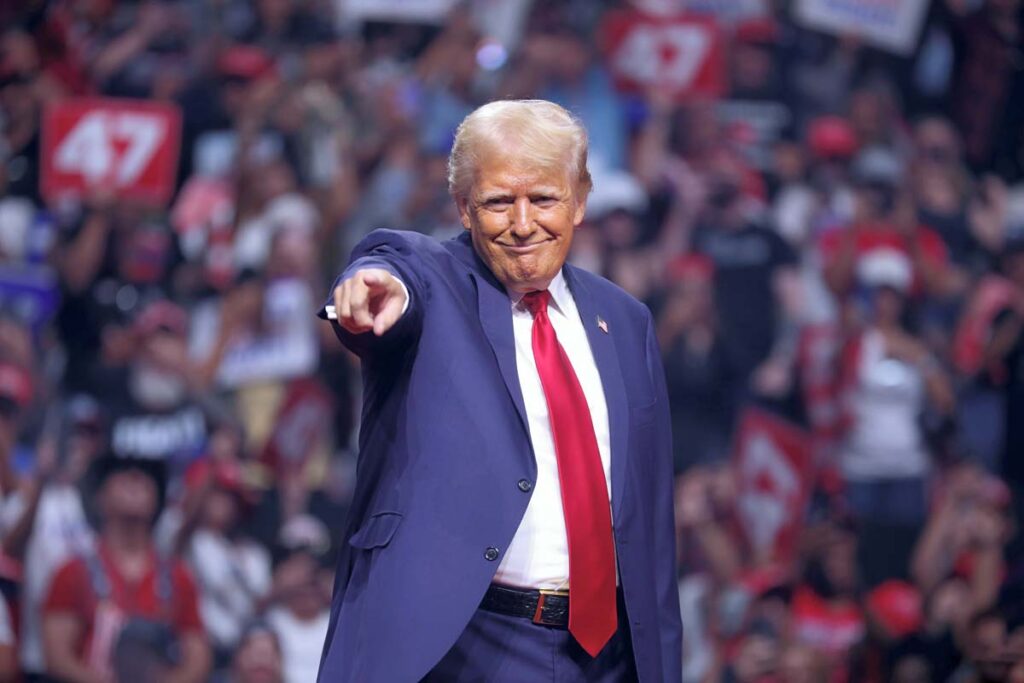

DAVID PORTER, Leading writer, Bay of Plenty Business News
A Trump card has again been played in the USA.
Donald Trump’s convincing win at the recent US election surprised many and has left the Democratic Party in tatters. While it remains to be seen how the result will impact New Zealand, Prime Minister Chris Luxon has conducted a cordial 15-minute exchange of views during a courtesy call with the new US President.
Principal of Groser and Associates, Tim Groser was a long-serving New Zealand diplomat, a former National Party trade minister and ambassador to the US. The veteran trade specialist told the Bay of Plenty Business News (BOPBN) that, although the result took the Democrats aback, the outcome should have surprised no one.
“I thought he’d win,” he said. “The data pointed towards a near Trump win.”
As to what the election result may mean for New Zealand, Groser cautions that New Zealanders should not overreact.
“The US is a very complicated country. Although it has immense powers, it also has immense constraints against it.”
At this stage, it is important to consider the impact of the upcoming midterm elections, which occur halfway through the presidential term, Groser added. Should the Democrats manage to secure the House of Representatives and/or the US Senate at the midterms, Trump’s power could be checked.
In the meantime, the Republican Party candidate won the presidency convincingly and the final results will confirm the degree of the popular vote success Trump has achieved.
Trump has been acting true to form in embracing his victory as an overwhelming endorsement of his theory that the government bureaucracy requires a drastic overhaul. He has signalled this with a series of what can best be described as ‘shock and awe’ appointments to his cabinet, including several who have been widely decried as having little management abilities or relevant experience.
Among Trump’s appointees was Republican firebrand Matt Gaetz as attorney general. Although Gaetz has a law degree, he is widely regarded as being inappropriately qualified for the job. According to some reports from the US, he also has damaging baggage in his private life which risks souring his appointment.
So, it came as no surprise that Gaetz announced, shortly before BOPBN went to print, that he was ‘withdrawing’ from the nomination so as not to distract Trump’s agenda in assembling his new cabinet.
Unhappy electorate
People needed to step back from the data, Tim Groser advised, and ask a fundamental question: do people feel happy?
“If so, they vote for the incumbent, if they’re unhappy, the opposite,” he said.
According to one pre-election poll, which Groser regarded as authoritative, just 29 per cent of US voters thought the country was going in the right direction. But, he warned at the time, if Trump doesn’t do well, it will have a serious impact on the world.
Trump’s announcement that he will impose punitive tariff charges against some countries (such as China) may well prove significant. Groser suggested that imposing these measures would be difficult and, according to many trade experts, such tariffs will inevitably raise the cost of certain imports. However, Trump will do something “and it won’t be positive,” Groser warns.
Anti Democrat shift
One of the key takeaways from the election is that the Democratic Party saw its traditional working class support crater. As noted by former Tauranga MP and Priority One chair, Todd Muller, there has been a significant reorientation of voter support in the US.
“The south used to be reliably Democratic and now it’s reliably Republican. You have blue collar, relatively uneducated tradespeople deserting the Democratic Party in droves,” he said. “The Democrats have become, largely, the party of educated elites in places [such as] New York City. [This] is a massive change from 30 years ago when the Dems were solidly working class and the representatives of money and wealth voted for the Republicans.”
Muller noted there had been a general turn against incumbency in Europe as well as in our own part of the world.
“It’s a cultural space that Trump has exploited,” he said.
It’s the economy, stupid!
 Massive adjustments took place in the US economy during recent years and Trump could rightly argue throughout his campaign that some things were more favourable during his first term.
Massive adjustments took place in the US economy during recent years and Trump could rightly argue throughout his campaign that some things were more favourable during his first term.
“The economy was front and centre of back pocket issues,” Muller said.
The Democrats have become, largely, the party of educated elites in places [such as] New York City. [This] is a massive change from 30 years ago when the Dems were solidly working class and the representatives of money and wealth voted for the Republicans. – Todd Muller
US-based Kiwi investment banker Peter Watson advised in an interview with TVNZ that, if Trump’s tariff policy is green lit, it will have “significantly negative” impacts on New Zealand businesses. He noted that veteran Democratic strategist James Carville – who coined the term “It’s the economy, stupid” – had observed earlier in the election cycle that people preferred ‘strong’ over ‘wrong.’
“Kamala Harris didn’t really do a very good job of expressing who she was.”
It appears voters were prepared to discount potentially worrying aspects of a Trump presidency and were resonating with the strength of his positions.
Harris – who replaced President Joe Biden as the Democratic candidate – also came very late to the campaign trail, which didn’t help.
Essentially, Trump appeals to people without college degrees and there are more people without college degrees than with them. Many African Americans and Latinos have also moved over to his camp in significant ways, Peter Watson added.
“On the other hand, [Harris] did retain the more educated urban population, but that’s a shrinking pool compared to the other demographics.”








